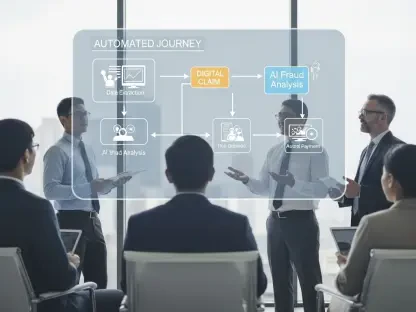The bookkeeping world, historically laden with manual tasks and meticulous data handling, is undergoing a revolutionary shift. As businesses increasingly seek efficient and streamlined financial operations, artificial intelligence emerges as an instrumental force. A particularly striking example of this transformation is evidenced by Rillet, an innovative startup that has captivated attention with its AI-driven general ledger system. Through the lens of this three-year-old company, the evolving dynamics of accounting are becoming more apparent, as AI is being tapped to reduce the burden of financial reporting, creating new benchmarks in industry practices.
The Rise of AI in Accounting
Automating Traditional Accounting Processes
At the core of every business’s financial ecosystem, the general ledger holds an indispensable role by summarizing financial transactions to produce precise financial statements. However, this process has traditionally required extensive human intervention and time. With the advent of AI, startups like Rillet have begun to radically reshape these conventions. By deploying machine learning and generative AI, Rillet’s platform dramatically reduces the time required for accounting teams, particularly in mid-sized companies, to close books from several weeks down to a few hours. This enhancement not only saves considerable time and resources but also sets a new paradigm in accounting efficiency, offering businesses an edge in today’s fast-paced market.
The efficiency gains are further boosted by Rillet’s integration with major financial platforms such as Salesforce and Stripe, streamlining the extraction and analysis of financial data. This seamless integration eliminates manual errors, ensures consistent data quality, and allows accountants to focus on higher-value tasks like strategic planning and analysis. As organizations transition to these advanced technologies, they witness a notable reduction in operational burdens, positioning themselves competitively in an increasingly dynamic business environment.
Competing with Legacy Systems
Rillet’s rapid ascent in the accounting software industry is a testament to its strategic deployment of AI capabilities. Since its product launch, the startup has achieved a fivefold increase in revenue, amassing a customer base of nearly 200 tech companies. These organizations previously relied on established systems like NetSuite, but Rillet competes aggressively by offering enhanced efficiency and adaptability. Its solution not only simplifies the complex challenges associated with traditional systems but also navigates the intricate processes of customer transitions—ensuring smooth data transfers without disruption to ongoing operations.
Amidst these advancements, the backing of substantial investors like Sequoia Capital underscores the profound industry shift toward AI-driven solutions. Rillet has recently secured $25 million in Series A funding, adding to its initial $13.5 million seed round. This influx of capital will facilitate further innovation and market penetration, propelling Rillet ahead of long-standing incumbents by replacing legacy platforms with its agile, AI-centric approach. In an industry where rapid data analysis is paramount, Rillet’s solution offers unique advantages that traditional systems struggle to match.
Rillet’s Strategic Positioning
Simplifying Transitions with AI
Rillet’s strategic positioning enables it to effectively target and address the specific needs and pain points of medium-sized businesses. Its AI technology significantly shortens the typically lengthy period required for data transition from older systems to new platforms. By reducing this timeframe from several months to about four to six weeks, Rillet offers businesses the flexibility to concurrently operate their existing systems until they confidently migrate to the new setup. This feature mitigates potential disruptions, preserving business continuity and minimizing any operational risks associated with technology changes.
Despite the potential competition from startups like Digits, which specialize in catering to small businesses, Rillet has carved out a niche by focusing on medium-sized enterprises. This distinction is bolstered by Rillet’s emphasis on harnessing advanced AI capabilities to provide tailored, scalable solutions that meet the nuanced needs of its target market. Consequently, Rillet enjoys a competitive advantage, ensuring its solutions are not only technologically superior but also finely aligned with the strategic objectives of the companies it serves.
A Broader Industry Implication
The broader implications of Rillet’s rise are emblematic of a larger trend within the accounting software sector, where artificial intelligence and machine learning are increasingly central to modernizing core financial functions. As companies pivot toward technology-driven solutions, the operational landscape shifts, prioritizing agility, precision, and adaptability. Accounting teams benefit from reduced operational burdens as AI takes on repetitive tasks, freeing professionals to dedicate more time to strategic initiatives that drive business growth. This trend highlights a critical junction in the evolution of accounting software, marking a shift from manual processes to digital automation.
Rillet’s journey also illustrates the mounting investment interest that AI-centric solutions attract, evidenced by Sequoia Capital’s involvement. By championing innovation in the accounting domain, investors see opportunities for substantial returns, while companies reap the benefits of improved efficiency and real-time insights into their financial health. This evolution not only enhances the accuracy and timeliness of financial reporting but also encourages a culture of continuous improvement and technological advancement, setting the stage for future developments in the years to come.
Charting the Way Forward in AI Accounting
The bookkeeping industry, once dominated by manual processes and intricate data management, is currently in the midst of a profound transformation. As businesses aim to improve efficiency and simplify their financial operations, artificial intelligence has emerged as a pivotal tool. A notable example of this shift comes from Rillet, a forward-thinking startup that has garnered attention for its AI-powered general ledger system. Founded just three years ago, Rillet exemplifies the changing landscape of accounting, where AI technology is being harnessed to alleviate the challenges of financial reporting. This trend not only simplifies procedures but also establishes new standards in industry practices, as companies increasingly adopt innovative solutions to keep pace with evolving demands. This AI integration is reshaping traditional accounting roles and redefining the way financial data is managed, offering promising possibilities for the future of accounting and financial strategies.









